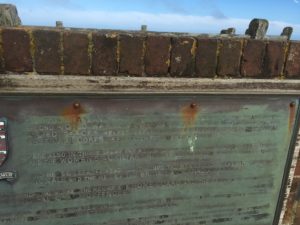About three years ago, when I was writing The Chalky Sea, I read as much as possible about the impact of the Second World War here in my home town of Eastbourne. I wanted my main character, Gwen Collingwood, a childless married woman whose husband has gone to war, to have an interesting and worthwhile job. She was in the Women’s Voluntary Service, sorting clothes and dispensing teas, but I decided she could also do some secret war work. So I sent her off up to Beachy Head to sit in a draughty hut all night with an uncommunicative RAF officer, listening into German radio transmissions from pilots. It was a bit of fabrication on my part, as while I knew there’d been a chain home station up there (basically an RAF radar early warning station), there was no evidence of an intercept station. Nonetheless it seemed plausible, given my knowledge of the location on the south coast, its seventy mile proximity to France and part of the coastline where Hitler had planned to invade in the aborted Operation Sea Lion. The photograph shows the weather-worn plaque up at Beachy Head where the town commemorated the many personnel who served in and around those clifftops during World War Two.
 Gwen was recruited to this work thanks to her friendship with a senior army officer who knew she spoke fluent German. She was interviewed in what is now Eastbourne College. The school was briefly occupied by the RAF in 1940 but then became HMS Marlborough, a naval training school specialising in torpedo and underwater warfare. Her training complete, Gwen is sent to work up at Beachy Head.
Gwen was recruited to this work thanks to her friendship with a senior army officer who knew she spoke fluent German. She was interviewed in what is now Eastbourne College. The school was briefly occupied by the RAF in 1940 but then became HMS Marlborough, a naval training school specialising in torpedo and underwater warfare. Her training complete, Gwen is sent to work up at Beachy Head.
Secrets in a London Attic
Imagine my delight when just a couple of weeks ago I discovered my imagination was closer to the truth than I realised. It turns out there was a secret intercept station up on Beachy Head, doing exactly what Gwen and the RAF were doing – listening in to German radio signals. The discovery was made when the wartime diary of an RAF technician was found in the false bottom of an old suitcase in a London attic – and no, I didn’t make that up!. This man had always claimed to have worked at the chain home station but it turns out this was merely a front for a bigger top-secret operation.
WRNS operators had accidentally picked up some strange signals from occupied France which they passed to the RAF. To their surprise, RAF Intelligence discovered they were actually television signals. Like the BBC, French television transmissions had ceased at the outbreak of war, but unsuspected until then, the Germans had started transmitting again from the Eiffel Tower to provide news to hospitalised soldiers. Normally such signals would not extend more than about forty miles and hence too far to reach the English coast – or so the Germans believed. A massive aerial was set up at Beachy Head to receive the signals, operated by the RAF with German-speaking women, WAAFs, to transcribe all received messages ready to be sent on to Station X – Bletchley Park. And my hunch was right on another account as the WAAFs also listened out for conversations between Luftwaffe pilots and their controllers – just as Gwen did!
You can read more about the discovery here and in the recently published account of this secret station, written by local Eastbourne historian, Michael Ockenden, Wartime TV Pictures from Paris at Beachy Head. His other book, Canucks by the Sea was incredibly useful to me when I wrote The Chalky Sea, providing valuable details about the Canadian military presence in Eastbourne.

Here’s an extract from The Chalky Sea, about Gwen’s work up on Beachy Head:
Gwen was cold. Colder than she’d ever been – despite her heavy coat and thick gloves. She leaned against the wall and rubbed her hands up and down her arms and tried to stop shivering. The roof was leaking and the rain was beating a tattoo on the tin covering. A drip ran down her neck so she edged sideways. Every night for the past week she’d spent sitting on a canvas folding chair in this cramped space with a young air force warrant officer who had acne and bad breath. He had made it clear to Gwen, without saying as much, that being here in a repurposed railway container on a clifftop with a middle-aged woman was not the assignment he’d been hoping for. Gwen tried to make conversation, but Warrant Officer Irving shrugged or answered her questions with monosyllables so she eventually settled for an uncomfortable silence.
Her job was to listen into the German VHF voice transmissions and log everything she heard. It was one thing to sit happily twiddling the dials of the wireless equipment in a comfortable classroom and another to be doing it with icy cold hands in a tin box on top of Beachy Head.
Most of the time it was Luftwaffe pilots talking to their controllers. As she became accustomed to listening she began to recognise different regional accents. Occasionally she recognised some of the individual voices.
The radio traffic had been quiet tonight. It meant she had plenty of time to translate the messages she had logged before they were picked up by a motorcycle rider and whisked away to a destination unknown, referred to only as Station X.
At first, on busy nights she had tended to translate as she listened, writing the messages down in English. That approach earned her a reprimand – the powers-that-be wanted both the verbatim German and her translation. It was irritating. If they didn’t trust her translation skills why not just get her to transcribe the verbatim German? It was not up to her to question though, and in a war maybe it was necessary to check everything and trust no one. Gwen told herself the important thing was that she was directly involved in the war effort.
Listening to these young German pilots informing their base stations that they were headed for home made her feel close to the action, playing a vital role, even though it was hard to imagine what use her work would be put to. Much of it was reportage of things that had already happened and by the time her transcriptions reached the mythical Station X it was probably far too late to do anything about them. Maybe they were looking for patterns though? Perhaps there was significance in things that she couldn’t see? It was like a giant jigsaw puzzle and she was collecting pieces with no sight of the bigger picture.
Sometimes the intercepts involved the Germans reporting sighting of British convoys. Whenever this happened she would alert Warrant Officer Irving as she listened and scribbled, and he would jump into life and immediately send messages to alert the RAF to scramble to protect the ships involved. The convoys were carrying supplies of essentials – food and armaments – so her work was indeed making a difference. At last she was in the thick of things.
The Chalky Sea is available in paperback, ebook and audio formats. Click here to find out more


The Chalky sea is my favourite so far , a great plot and set somewhere I know so well or so I thought until I read Clare’s novel!
Thank you! So pleased – especially since you know the area!
This is still my favourite book and you are so right because after reading my free copy I then purchased my own copy and the two following in the series. Loved them all.
That’s fantastic – thank you so much for your support, Erica. I really appreciate it!